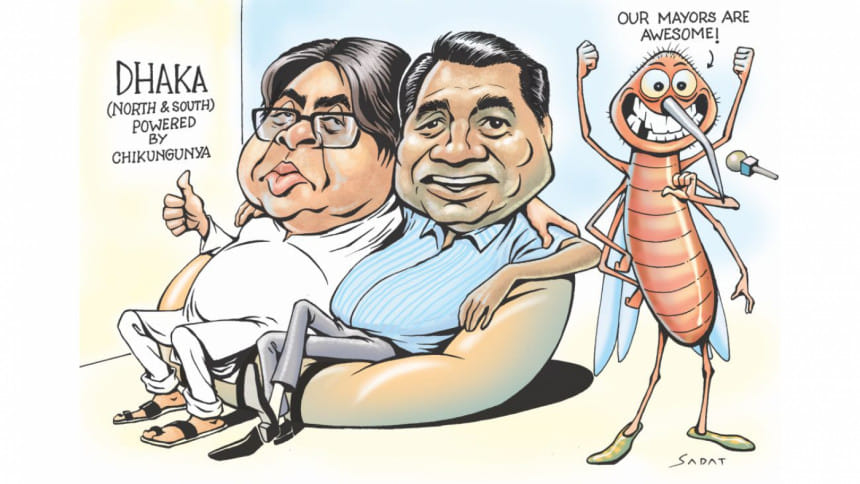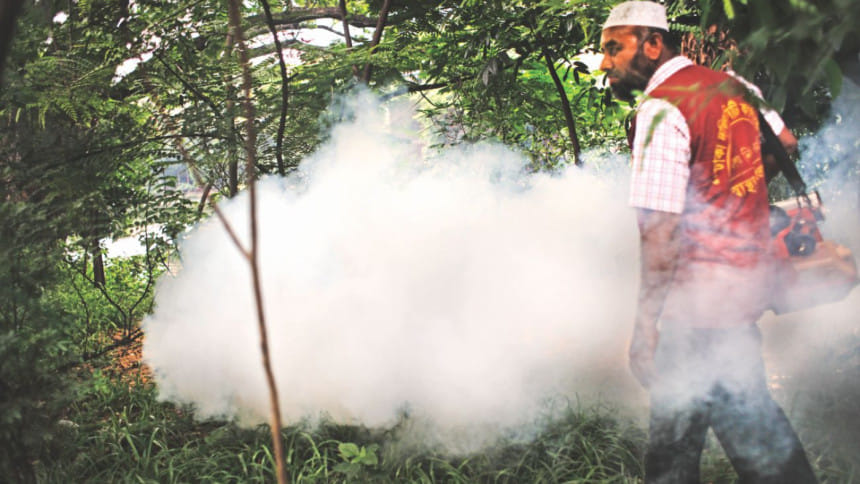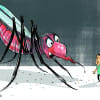Aedes Alarm: Govt goes for 'symbolic' awareness campaign

In the wake of a chikungunya outbreak, the health and family welfare ministry in association with the two Dhaka city corporations organised an awareness campaign on the viral disease yesterday.
During the five-hour campaign from 9:00am, several hundred students and teachers from dental, medical colleges and health technology institutes raised awareness on the cause and prevention of chikungunya among people in 92 wards of the capital.
The campaigners asked the city dwellers to keep their households and surroundings clean and remove stagnant water from containers which may have larva or pupae of Aedes mosquito that transmit the disease to humans.
The initiative comes after a recent government study found high presence of Aedes mosquitoes in the capital.
During June 1-5, the Directorate General of Health Services (DGHS) conducted a survey in 53 areas of the city and found a very high presence of the mosquitoes in 47 areas.
The survey also found that some 52 percent of containers -- plastic barrels, buckets, clay pots, used or abandoned tyres and tubes, and water tanks -- have larva or pupae of the mosquito in them.
According to the DGHS control room, 378 dengue cases were reported between January 1 and June 15. During the same period, the Institute of Epidemiology, Disease Control and Research (IEDCR) found about 400 cases of chikungunya.
The DGHS, which began recording chikungunya cases since June 1, received reports of 228 cases till June 15 from different hospitals in the capital.
Yesterday's campaign was inaugurated by Health and Family Welfare Minister Mohammed Nasim in Dhanmondi area.
“It's a symbolic campaign which is being organised to aware people [of chikungunya] and boost the ongoing mosquito-control drive by the city corporations,” he said.
“Chikungunya can be cured by taking medicine, rest and drinking enough water. But if we take preventive measures, we won't have to suffer from the disease,” he added.
DSCC Chief Health Officer Brig Gen Sheikh Salahuddin said the city corporation has recently employed 108 additional workers to boost the drive against mosquitoes.
DGHS Director General Prof Abul Kalam Azad said the campaign focused on Dhaka as all the cases of chikungunya have been reported in the city. “We also used loudspeakers to raise awareness among people about the disease in several upazilas.”

During the campaign, the students and teachers stood by roads holding placards that read “Let us keep our home and neighbourhood clean to prevent chikungunya.”
Later, they cleaned some roadside garbage and containers, and went from house to house and talked to the residents, said a press release from the DGHS.
Some teams from Dhaka South City Corporation (DSCC) and Dhaka North City Corporation (DNCC) spread insecticides in some areas of the city to destroy Aedes larva.
Meanwhile, the ministry organised another such campaign in Manikganj city, where State Minister for Health and Family Welfare Zahid Maleque was present.
According to doctors, chikungunya causes fever and severe joint and muscle pain, headache, nausea, fatigue and rash. Joint pain is often very debilitating, but usually lasts for a few days or may be prolonged to weeks.
While dengue can be at times fatal, chikungunya is not. However, for patients with old-age complications or diabetes, chikungunya may lead to fatalities.

 For all latest news, follow The Daily Star's Google News channel.
For all latest news, follow The Daily Star's Google News channel. 







Comments